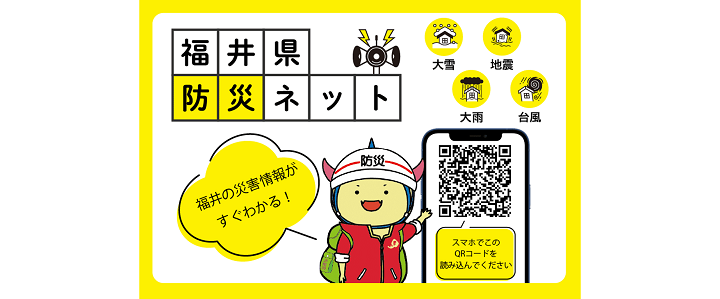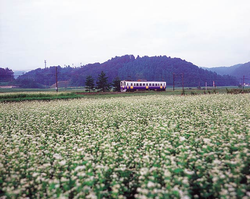Fukui Friendship Ambassador Newsletter 2007 Vol.4
How have you been doing? Autumn is in full swing in Fukui. This is my third fall since coming to Fukui, and I find it to be a very pleasant season, with lower temperatures in the mornings and the evenings and pretty fall flowers, such as cosmos. How are you spending this season in your country?
As you know, the Japanese call fall the season for eating, or for playing sports. As it turns out, this issue's "Hello from Fukui" column features ALTs, English teachers in Fukui's schools, who are involved in soccer tournaments. As for eating, the first thing that comes to mind is Echizen Oroshi Soba (buckwheat noodles with grated white radish), a favorite of Fukui's residents. At this time of year, you can see scenery like this photograph whenever you travel outside of Fukui City. As many of you may know, these are soba flowers. One of fall's pleasures is eating Echizen Oroshi Soba made from freshly harvested soba. How about visiting Fukui for a taste of some?
Fukui and beyond...
- Landing Examination Procedures for Japan Change
- The Immigration Control and Refugee Recognition Act was partially amended on May 24th, 2006. Accordingly, changes to Japan's landing examination procedures will go into effect on November 23rd. Under these new procedures, foreigners entering Japan will be fingerprinted and photographed, after which they will be interviewed by an immigration officer. Foreigners who are required to provide personal information but who refuse to be fingerprinted or photographed will be denied entry into Japan and ordered to leave. With a few exceptions, such as special permanent residents and children under the age of 16, almost all foreigners will be subject to the new procedures.
- The Immigration Bureau has stated that it hopes the new procedures will serve as an antiterrorism measure, by collecting personal information to prevent terror suspects from entering the country. The Bureau has also released a video explaining the new procedures in several languages in an effort to foster understanding among foreigners affected by the new procedures.
- Japan Post Group Launched
- The privatization of Japan's postal system, part of the administrative and financial reforms pursued by former Prime Minister Koizumi, have begun in earnest. On October 1st, the Japan Post Group was officially formed. Between its postal, financial, and insurance businesses, this colossal group of companies has 240,000 employees. Along with the Japan Post Holdings President Yoshifumi Nishikawa, former Prime Minister Koizumi and Prime Minister Fukuda attended the ceremony held at the Japan Post headquarters on the morning of the 1st to mark the start of privatization.
- Indications of the new privatization were visible at post offices around the country: before the 1st, signs outside of the offices were changed, and inside the offices, dividers were placed between the windows for the postal and banking companies; furthermore, the counters for the bank were painted green, whereas the color for the counter of the new postal company is orange.
- Volunteer Cafe Opens in Fukui Prefecture
- In order to promote volunteer activities, Fukui Prefecture opened a Volunteer Cafe on October 2nd. The Cafe is located within the Kenmin Katsudo Center (Prefectural Residents Activities Center) on the 7th floor of Aossa, a building constructed this year near the station. The Cafe offers information on volunteer activities, and staff members are available to advise people interested in volunteering. With self-service coffee, the Cafe has been designed so that people will feel free to stop by. This is the first facility of its type in Japan that is administered at the prefectural level.
- At the opening ceremony on October 2nd, Fukui's vice-governor Nobuaki Asahi expressed his hope that the center would be visited by many and lead to increased volunteering, after which he and other officials cut the ribbon to officially open the Cafe.
- Fossil of Large Dinosaur Unearthed in Katsuyama City
- Katsuyama City is well known for its dinosaur fossils. In 1988, the tooth of a small, carnivorous dinosaur was discovered, and the following year, work on the first Fukui Dinosaur Fossil Excavation Project commenced. Since then, numerous bone and eggshell fossils have been unearthed, and on July 4th of this year, as preparations were being made for the third Fukui Dinosaur Fossil Excavation Project, a fossil belonging to a large dinosaur was discovered.
- The bone measures 90cm in length and 25cm in width. The bone, thought to be the humerus of a sauropod, was placed on display in August, after which it was cleaned. This is the second longest humerus to have been discovered in Japan, after the 115cm titanosaurus bone discovered in Toba City, Mie Prefecture, in 1996.
- On August 9th, the elbow bone of a sauropod was also discovered a mere three meters away from where the humerus was discovered on July 4th. Hopes are high that many more fossils will continue to be unearthed.
Hello from Fukui!
- This month's report comes from Daniel Schick, an ALT an avid soccer player living in Katsuyama City.
Although English teachers come to Japan from different parts of the world, soccer is a language that people everywhere understand. Twice a year, there are two major soccer tournaments that involve hundreds of JET English teachers from nearly every prefecture in Japan. In September, the Fukui "Fist" soccer teams went to Nagano-ken to participate in the ALT East Tournament (the West Tournament was held in Awaji Island). Although most of the participants in the tournament are current JET's, one does not have to be a JET to participate. Like most prefectures, Fukui has several Japanese friends on the team, and there were also Chinese and Brazilian teams, as well as one from the British Embassy. All in all, it's a place where we get together, enjoy the beautiful game of soccer, and have a drink to our homelands.
This year Fukui brought over 40 players to the tournament, fielding two men's teams, and one women's – the most of any prefecture. In total, the Nagano tournament had 35 teams from 20 prefectures, but Fukui is proud to say that it is among the most involved and active prefectures in all of Japan. On the field, both the men's and women's teams were eliminated in the quarter-finals, but the measure of success is not only in wins and losses. Off the field, we cheered ourselves hoarse and yelled 'Cheers!' all night. In the spring, we'll be ready to do it all over again in Awaji Island. Long live the Fukui Fist! Joga Bonita! Kampai!
Ambassador Interview
- This month's interview column features a former Friendship Ambassador, Steven Watanabe, who worked as a Coordinator for International Relations (CIR) in Fukui Prefecture from 1995 to 1998.
Q: Where do you live now?
A: We currently live in the suburbs of Sacramento, California in the bedroom community of Rocklin. The town is also nestled near the Sierra Foothills. Rocklin has a population of close to 50,000.
Q: What did you enjoy best about being a CIR in Fukui?
A: Without a doubt, the diversity of the job was the most appealing part of being a Fukui-ken CIR. Looking back over the years, the Fukui CIR position was one of the best work experiences that I have encountered so far. The global feel and the people you meet there, not only citizens of Fukui but people from all over the world―it's really an amazing experience.
Q: What was the most difficult aspect of working in Japan?
A: At the time, smoking was permitted inside the office. The co-worker next to me used to smoke over a pack a day.
Q: How were you involved with helping to open the new Fukui International Activities Plaza?
A: The Opening Festivities and the International Jamboree was something that I was heavily involved in along with many other JETs at the time. I remember having countless meetings with ALTs to see what we could do to contribute at the grassroots level. We came up with the idea of an International Art & Crafts Booth for children in Fukui, and of having a Bake Sale (with goodies from our home countries) with proceeds to help pay for the materials. I can't believe that I made Gingerbread Cookies at the time. Turns out that we made so much money from the Bake Sale, we ended up making hefty donations to several non-profit organizations. It's good to see events are still carried on till this day.
Q: Have you been back to Fukui since you left? If so, how had it changed?
A: I consider Fukui my second home. We've been back to Fukui twice since returning to the U.S. Each time we do come and visit friends and family in Fukui, it's really an "Urashima Taro" experience. What astonished me the most when I last returned was the Fukui Train Station. It had become so modernized and big. I imagine the next time I visit Fukui, I'm sure there will be more amazing things that will surprise me.
Q: What's something you miss about life in Fukui?
A: I guess it would revolve around my sense of smell. In the U.S., you can get your hands on relatively any kind of Japanese food to a certain degree. I can even watch Japanese news through satellite TV or read about Fukui through the Internet or visually reminisce about Fukui through my fond memories. However, it's really difficult to recreate the smell of Echizen Coastline and the fragment smell of the daffodils, the lush green smell of the forest near Eiheiji Temple or aromatic smell of cherry blossoms falling on Asuwa River.
Q: Thank you very much!
アンケート
より詳しくご感想をいただける場合は、inbound@pref.fukui.lg.jpまでメールでお送りください。
お問い合わせ先
インバウンド交流課
電話番号:0776-20-0699 | ファックス:0776-20-0381 | メール:inbound@pref.fukui.lg.jp
福井市宝永2丁目4-10 福井県宝永分庁舎2階(地図・アクセス)
受付時間 月曜日から金曜日 8時30分から17時15分(土曜・日曜・祝日・年末年始を除く)














